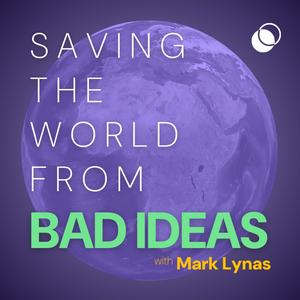🔍 Episode Summary:What if the bad idea… is thinking we can still save the Arctic?In this sobering but illuminating conversation, Mark Lynas speaks with renowned polar climate scientist Julienne Stroeve to explore one of the most consequential but misunderstood climate tipping points: the melting of the Arctic.Together, they unpack the science behind sea ice loss, permafrost thaw, Greenland melt, and the feedback loops that could push the climate system toward runaway warming. Julienne, who has spent decades conducting fieldwork and analysing satellite data, explains why the idea that we can still "save" the Arctic is, sadly, a myth — and what that means for global sea level rise, extreme weather, and the fate of species like polar bears.From icebreaker expeditions to geoengineering schemes, this episode takes you to the frontlines of a rapidly disappearing world.🧠 Topics Discussed:🧊 Why the Arctic sea ice is already committed to disappearing in summer📉 The science behind Greenland’s melt — and how fast it’s accelerating🌊 Sea level rise: how much, how soon, and where it hits hardest🐻 Polar bears, permafrost, and the myth of adaptation💣 The risk of tipping points and feedback loops (albedo, methane, etc.)❄️ What past interglacial periods tell us about a future without Arctic ice🌍 Why what happens in the Arctic doesn’t stay in the Arctic🌀 Jet streams, polar vortexes, and extreme weather in a warming world🧪 Geoengineering: what might work, what probably won’t🛰️ The role of satellites and field data in improving climate models🇺🇸 The growing threat of political interference with science in the US👩🔬 Guest Bio:Dr. Julienne Stroeve is a polar climate scientist and professor currently affiliated with the University of Manitoba and University College London. Her work focuses on satellite remote sensing, Arctic sea ice, climate modeling, and the impacts of climate change on polar systems. She has participated in numerous field expeditions, including the landmark MOSAiC expedition, and is one of the world’s leading experts on Arctic cryosphere dynamics.📚 Recommended Reading & Resources:Why the Arctic Is Already Lost – Science commentary by Julienne Stroeve (via Science.org)MOSAiC Expedition Overview – AWINSIDC – National Snow and Ice Data CenterNASA Earth Observatory – Arctic Sea IceArctic Report Card – NOAAArticle: Why Geoengineering the Arctic is a Bad Idea – The Conversation💬 Quote Highlights:“The Arctic is warming four times faster than the global average.” – Julienne Stroeve“The idea that we can still save the Arctic is a bad one. It’s already on a committed trajectory of decline.” — Julienne Stroeve“What happens in the Arctic doesn’t stay in the Arctic. It reshapes weather patterns across the globe.” — Julienne Stroeve“Greenland is now the largest contributor to sea level rise — and that contribution is accelerating.” — Julienne Stroeve“At 2.7 degrees of global warming, parts of the world will become uninhabitable.” — Julienne Stroeve“I used to be hopeful. But now? I think we’ll wait for disaster — and then act.” — Julienne Stroeve🌐 About WePlanet:WePlanet is a global citizen and science movement advancing bold, evidence-based solutions for climate, nature, and human development. Learn more at weplanet.org.📥 Join the Conversation:💬 Feedback or thoughts? Email:
[email protected] 📬 Subscribe for updates: weplanet.org/podcast
